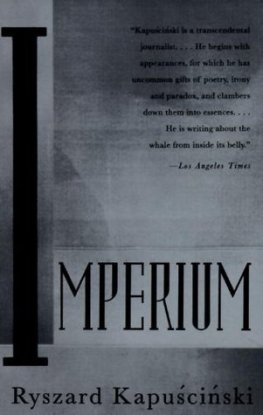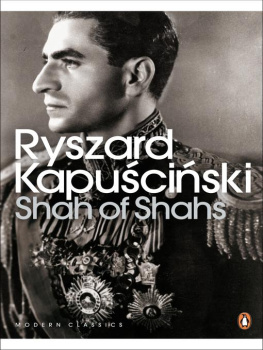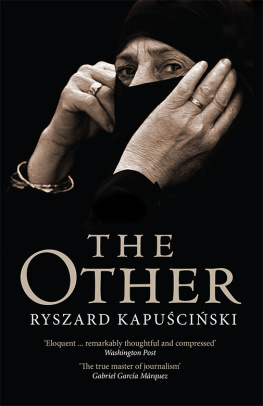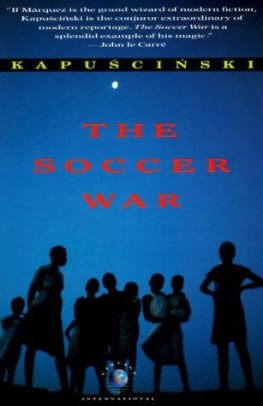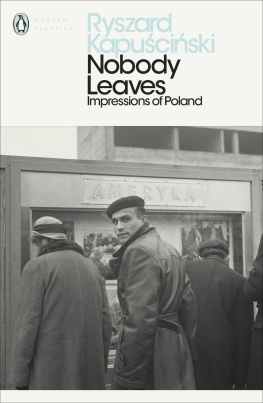Ryszard Kapuscinski
Imperium
in other words, that these are wonders; and all of this constitutes a picture.
ANDREI BIELY, Imperium
Russia has seen many things during the one thousand years of its history. There is only one thing that Russia has not seen in one thousand years freedom.
VASILY GROSSMAN
The present is something that binds us. We create the future in our imagination. Only the past is a pure reality.
SIMONE WEIL
In Russia, an artists entire energy should be directed at showing two forces: man and nature. On the one hand, physical weakness, nervousness, early sexual maturity, a passionate desire for life and truth, a dreaming of a range of activity as wide as the steppe, analysis full of anxiety, a lack of knowledge together with high conceptual flights, and on the other hand a boundless plain, a severe climate; a severe, gray nation with its heavy, grim history, its Tatar period, officialdom, ignorance, poverty, the humid climate of the capitals, Slavic apathy, etc. Russian life so threshes the Russian that he cannot collect himself, it threshes him like a thousand-pood stick.
ANTON CHEKHOV
Our dominant impression of things Russian is an impression of a vast irreparable breakdown. The great monarchy that was here in 1914 and the administrative, social, financial, and commercial systems connected with it have, under the strains of six years of incessant war, fallen down and smashed utterly. Never in all history has there been so great a dbcle before.
H. G. WELLS, 1920
The adventure that is the Soviet Union is the greatest experiment and the most important problem of mankind.
EDGAR MORIN
Russia vomited out the abomination that they were feeding it.
FYODOR DOSTOYEVSKY
The system that governs us is a combination of the old nomenclatura, the sharks of finance, false democrats, and the KGB. I cannot call this democracy it is a repugnant, historically unprecedented hybrid, and we do not know in which direction it will develop [but] if this alliance will prevail, they will be exploiting us not for seventy, but for one-hundred and seventy years.
ALEKSANDR SOLZHENITSYN, 1992
Something has been clarified there, but something still remains obscure.
VLADIMIR VOINOVICH
THIS BOOK consists of three parts.
Part 1 is called First Encounters (19391967) and is a report on my long-ago sojourns in the Imperium. In it I tell about the entrance of Soviet troops into my hometown in the Polesie region of Poland (today this is Belorussia), about a journey across a snow-covered and desolate Siberia, about an expedition to Transcaucasia and to the republics of Central Asia in other words, to the territories of the former USSR that are filled with exoticism, conflicts, and a singular atmosphere replete with emotion and sentiments.
Part 2 is called From a Birds-Eye View (19891991); it is an account of several of my longer wanderings over the vast lands of the Imperium, which I made in the years of its decline and final disintegration (final at least insofar as the form in which it existed in 1991 is concerned). I made these journeys alone, bypassing official institutions and routes, and the path of these expeditions led from Brest (the border between the former USSR and Poland) to Magadan on the Pacific, and from Vorkuta beyond the Arctic Circle to Termez (the border with Afghanistan). A total of about sixty thousand kilometers.
Part 3 is called The Sequel Continues (19921993) and is a collection of reflections, observations, and notes that arose in the margins of my travels, conversations, and readings.
This book is written polyphonically, meaning that the characters, places, and themes that thread their way through its pages might reappear several times, in different years and contexts. However, in contrast to the principles of polyphony, the whole does not end with a higher and definitive synthesis, but, on the contrary, it disintegrates and falls apart, and the reason for this is that in the course of my writing the book, its main subject and theme fell apart namely, the great Soviet superpower. In its place new states arose, among them Russia an enormous country, inhabited by a people who for centuries were animated and unified by the imperial ambition.
This book is neither a history of Russia and the former USSR nor a history of the birth and fall of communism in this state nor a handy compendium of knowledge about the Imperium.
It is a personal report based on journeys that I took across the great expanses of this country (or, rather, of this part of the world), trying to get to whatever places time, strength, and opportunity permitted.
FIRST ENCOUNTERS (19391967)
MY FIRST ENCOUNTER with the Imperium takes place near the bridge linking the small town of Pisk, Poland, with the territories to the south. It is the end of September 1939. War is everywhere. Villages are burning; people are taking shelter from air raids in ditches and in forests, seeking salvation wherever they can. Dead horses lie in the road. If you want to pass, a man advises, you will have to move them to the side. How much time is lost because of this, how much sweat: dead horses are very heavy.
Crowds of refugees, fleeing in dust, dirt, panic. What do they need so many bundles for, so many suitcases? Why so many teakettles and pots? Why are they cursing? Why are they constantly asking questions? All of them are walking, riding, running somewhere nobody knows where. But my mother knows exactly where we are going. She has taken my sister and me by the hand, and all three of us are heading to Pisk, to our apartment near Wesola Street. We were on holiday at our uncles near Rejowiec when the war surprised us, and so now we have to go back home. Tutti a casa!
After days of wandering we are near Pisk, and in the distance we can already see the towns houses, the trees of its beautiful park, and the towers of its churches, when suddenly sailors materialize on the road right by the bridge. They have long rifles and sharp, barbed bayonets and, on their round caps, red stars. They sailed here several days ago all the way from the Black Sea, sunk our gunboats, killed our sailors, and now they dont want to let us into town. They keep us at a distanceDont move! they shout, and take aim with their rifles. My mother, as well as other women and children for they have already rounded up a group of us is crying and begging for mercy. Plead for mercy, the mothers, beside themselves with fear, implore us, but what more can we, the children, do we have already been kneeling on the road, sobbing and stretching out our arms, for a long time.
Shouting, crying, rifles and bayonets, the enraged faces of the sweaty and angry sailors, some sort of fury, something dreadful and incomprehensible, it is all there by the bridge over the river Pina, in this world that I enter at seven years of age.
IN SCHOOL, starting in the first grade, we learn the Russian alphabet. We begin with the letter s. What do you mean by s? someone asks from the back of the classroom. It should begin with a!
Children, says the teacher (who is a Pole) in a despondent voice, look at the cover of our book. What is the first letter on this cover? S!
Petrus, who is a Belorussian, can read the whole title: Stalin, Voprosy Leninizma (Studies in Leninism). It is the only book from which we learn Russian, and our only copy of this book. On the stiff cover wrapped in gray linen, large, gold letters.
Departing from us, Comrade Lenin commanded us to , the humble and quiet Wadzio reads from the first row in a faltering voice. Best not ask who Lenin was. All our mothers have already instructed us not to ask about anything. But these warnings werent necessary anyway. I cannot explain it, I cannot say where it came from, but there was something so frightening in the air, something so tense and heavy, that the town in which we used to cavort with wild and joyful abandon had suddenly become a minefield. We were afraid even to take a deep breath, lest we set off an explosion.

